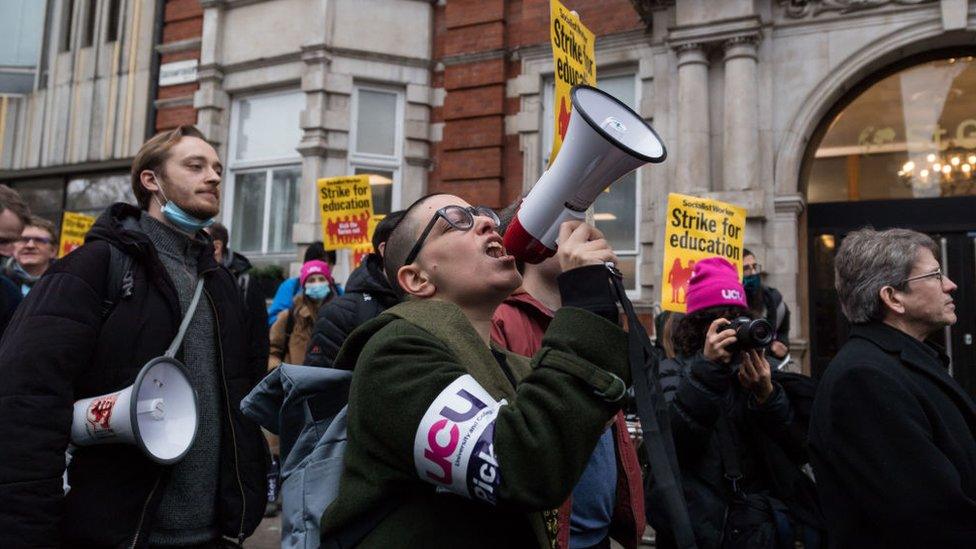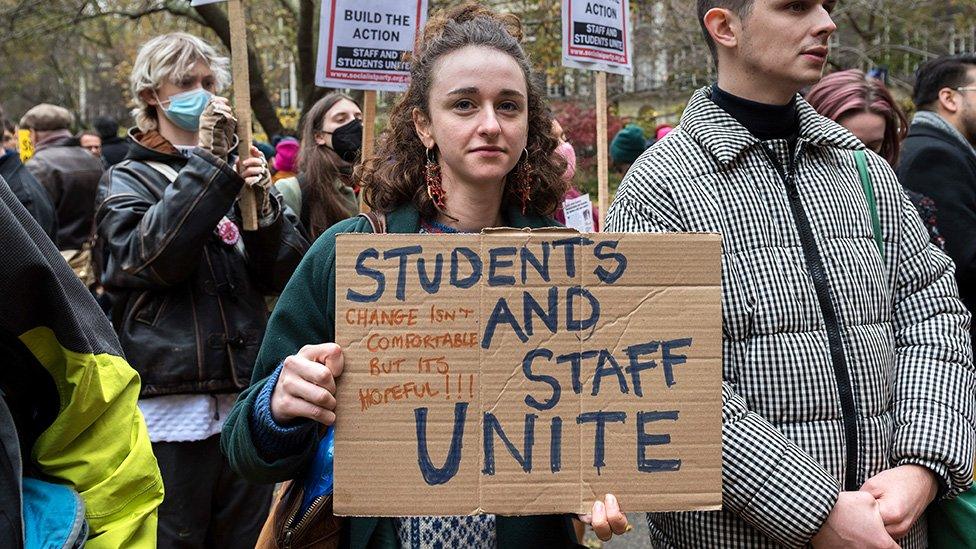University staff to go on strike this month
- Published

Students have supported previous strikes by lecturers and other university staff
University lecturers and other staff across the UK will strike this month over pay, pensions and working conditions, the University and College Union (UCU) has said.
Strikes will take place on 24, 25 and 30 November at 150 universities.
The UCU claims 70,000 staff members will strike.
Universities say they are "well-prepared" to "protect students' education".
Students - some of whom have supported previous strike action by university staff - could face lectures being cancelled or rearranged.
Staff will also start industrial action short of a strike from 23 November, UCU said, which could include things like refusing to cover for absent colleagues.
The walkouts are partly over pensions - a dispute that, having rumbled on for nearly a decade, was reignited by what the UCU called a "flawed valuation" of the Universities Superannuation Scheme (USS), a pension fund used by university staff.
And they are partly over pay. A 3% pay increase was proposed for staff this academic year, with 9% for those on the lowest pay grades. But UCU members want a pay rise to take the rising cost of living into account - much like unions in other sectors that have pushed for strike action in recent months.
Inflation - the rate at which prices rise - is the highest it has been for 40 years. That means workers' living costs are rising faster than their wages, leaving them worse off.
UCU general secretary, Jo Grady, criticised vice chancellors' salaries, comparing them to UCU members who were on "low-paid and insecure contracts".
"UCU members do not want to strike but are doing so to save the sector and win dignity at work," she said.
Universities UK (UUK), an organisation representing 140 institutions, said: "We appreciate this could be a difficult time for students, who may be anxious about possible disruption to their learning.
"Universities are well-prepared for industrial action and will put in place a series of measures to protect students' education, as well as other staff and the wider community."
The National Union of Students (NUS) is supporting the walkout.
Its higher education vice president, Chloe Field, said struggles students face - such as high rents, large tuition fees for international students and real-terms cuts to maintenance support - are happening because the university sector "has put profit above staff and student well-being" - which has also caused "huge workloads" for staff.
Raj Jethwa, chief executive of the Universities and Colleges Employers Association (UCEA), which represents university employers across the UK, said there would be "disappointment" across the sector.
He said the UCU needed to give its members "a realistic and fair assessment of what is achievable", adding that all higher education institutions "want to do more for their valuable staff but any increases in pay puts jobs at risk".
Education Minister Robert Halfon said the strikes were "disappointing" and urged all sides to work together "so that students do not suffer with further learning loss" after the pandemic.
He said any student worried about the impact of strikes on their education should raise it with their university.

Are you taking part in the industrial action? Are you a student who could be affected by the strike? Email: haveyoursay@bbc.co.uk, external.
Please include a contact number if you are willing to speak to a BBC journalist. You can also get in touch in the following ways:
WhatsApp: +44 7756 165803, external
Tweet: @BBC_HaveYourSay, external
Or fill out the form below
Please read our terms & conditions and privacy policy
If you are reading this page and can't see the form you can email us at HaveYourSay@bbc.co.uk, external. Please include your name, age and location with any submission.
Related topics
- Published24 October 2022

- Published1 December 2021

- Published1 August 2023
